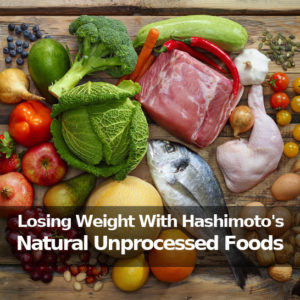How to lose weight with Hashimoto’s
-
Contents:
- Functional & Natural Medicine
- You May Not Be Getting the Right Lab Tests
- Stay Active
- Strength Training for Thyroid Health
- Beware of Over-Training
- Get off the “Standard American Diet”
- Just Say No to “Diet Foods”
- Consider a Revised Meal Plan
One of the most frustrating aspects of Hashimoto’s Disease and Hypothyroidism is unwanted weight gain. The cluster of thyroid symptoms creates something of a perfect storm that seems to drag down the overall health of so many of those affected. The question of how to lose weight with Hashimoto’s Thyroiditis is complicated by hypothyroid symptoms like: weight gain, fatigue, joint pain and depression (WomensHealth.gov). With a slowed metabolism causing weight gain while at the same time fatigue, depression and weight gain lower the motivation to lead an active healthy lifestyle, the struggle between one’s waistline and Hashimoto’s is all too real.

Despite all this, there is hope for regaining our health and hormone balance. Another piece of good news is that there are lifestyle changes and modifications to one’s meal plan that can often create very positive effects at reducing symptoms via improved hormone health. At my private practice in Portland, Oregon, I generally find the best clinical outcomes by addressing the underlying factors that contribute to Hashimoto’s Thyroiditis and hypothyroidism.
A few factors that can contribute to thyroid dysfunction are dormant/undiagnosed infections like SIBO (Small Intestine Bacterial Overgrowth) or EBV (Epstein-Barr Virus), imbalanced gut microbiome, nutrient deficiencies and chronic stress (adrenal fatigue). These contributing factors are often related to one another. For example, chronic EBV taxes the immune system’s resources, leaving the body depleted of nutrients and under the constant stress of desperately trying to fight off the virus; this chain of events can easily put the body into an autoimmune state where it attacks itself.
Very often, it is a combination of the above factors that lead to autoimmune thyroid conditions. Below is my list of a few strategies to help improve one’s health, wellness and fitness for patients suffering from Hashimoto’s Disease.
- Find a Doctor Who Understands Natural, Functional Medicine
-

When I treat patients for thyroid and other hormone imbalances, I look at the larger context of the entire human being sitting in front of me. Too often, the medical establishment treats hormone imbalances by using drugs to either boost or suppress the endocrine system back to “health”. However, this short-sighted approach does nothing to address the underlying health conditions that lead to Hashimoto’s Disease in the first place.Health conditions like nutrient deficiency, estrogen dominance, unhealthy gut bacterial overgrowth, Epstein-Barr Virus, complications from the Standard American Diet, past antibiotic use, imbalanced blood sugar, insulin resistance, past heavy metal exposure, poor nutrient absorption, stomach acid levels and even long-term stress can all exacerbate or contribute to thyroid dysfunction. Without dismantling these complex underlying and/or contributing factors, hormone imbalances will likely continue and even get worse.
Another troubling fact is that standard thyroid panels won’t raise an alarm until thyroid problems are bad enough to require a prescription drug. What this means is that the standard of care taught to many medical professionals won’t truly intervene until hormone dysfunction is has reached clinically unhealthy levels. In contrast, the functional medicine and naturopathic school of thought seeks to use natural interventions much earlier in the disease process so that drugs are unnecessary. For those who already need a prescription hormone replacement, functional medicine and naturopathic primary care seeks to resolve the complex health patterns that lead to hormone dysfunction in the first place.
When I do prescribe thyroid medications, I do so with a long-term goal of helping my patients reach a level of wellness where medications are no longer necessary.
- Get Comprehensive Labs & Hormone Panels
 For those who either have or suspect thyroid problems, it’s a good idea to have comprehensive thyroid panels and labs done regularly. A well-trained functional medicine and/or naturopathic doctor will know how to interpret those lab reports and translate them into a comprehensive plan for healing the underlying causes of hormone disruption. Pay close attention for any signs of depression, mood swings, low energy, weakness, shortness of breath, cramping, anxiety, dizziness or hair loss. These symptoms may indicate one of the common nutrient deficiencies that accompanies thyroid dysfunction.
For those who either have or suspect thyroid problems, it’s a good idea to have comprehensive thyroid panels and labs done regularly. A well-trained functional medicine and/or naturopathic doctor will know how to interpret those lab reports and translate them into a comprehensive plan for healing the underlying causes of hormone disruption. Pay close attention for any signs of depression, mood swings, low energy, weakness, shortness of breath, cramping, anxiety, dizziness or hair loss. These symptoms may indicate one of the common nutrient deficiencies that accompanies thyroid dysfunction.
Too often, the standard of care from primary care doctors is to run a basic thyroid panel and prescribe a hormone if necessary. However, these overly-simplistic tests don’t take other hormones that affect thyroid into account. Hormones like cortisol, insulin, estrogen, progesterone, TSH as well as the balance between T3 and T4. I also test for thyroid antibodies like anti-thyroid peroxidase and thyroglubulin, which are strong indicators of a thyroid autoimmune condition. In cases of Euthyroid Sick Syndrome, TSH and T4 levels may be normal, but serum T3 levels drop. This condition is complex and has been reported in the research in a variety of settings. But, there does seem to be a relationship between liver function and a strong inflammatory component, according to the research.
All this is to point out what naturopathic and functional medicine doctors understand: standard thyroid panels are not enough and patients deserve comprehensive hormone panels along with in-depth lab tests to check for nutrient deficiencies.

With symptoms like depression, fatigue and joint pain, the symptoms of Hashimoto’s Thyroiditis probably don’t lead one to feel like exercising much. That said, physical activity is still an important aspect of how to lose weight with Hashimoto’s disease. It’s important to stay active and incorporate movement into one’s daily routine in order to boost the metabolism while also stabilizing blood sugar and mood. Physical activity helps alleviate the stress that can exacerbate thyroid symptoms.
Strength training has been noted to be particularly helpful for patients with Hashimoto’s because it increases the metabolism, boosts mood, helps with hypothyroid symptoms and improves muscle tone. Consider exercises like squats, dead lifts, pushups and lunges because these movements work major muscle groups that will burn fat and keep us strong and healthy. On other days, mix in activities like walking, yoga, pilates or light/moderate aerobics to boost the metabolism, mood and circulation while also helping to reduce the symptoms of hypothyroidism.
It’s important to progress slowly and don’t over-train, because exercising too much will leave the body depleted of nutrients it needs for proper thyroid function. If you’re not used to physical activity, start slowly and talk with your doctor about your health and fitness goals first.

When it comes to fitness training with Hashimoto’s, there can definitely be too much of a good thing. While increasing one’s fitness and activity level is recommended for those with hypothyroidism, it’s important to keep in mind that exercise expends energy and depletes the body’s resources.
Be particularly careful with extended-time cardio workouts like distance running or cycling. These strenuous cardio exercises can be especially problematic if done right after strength training because the body has no chance to recover. Although running and cycling can burn a lot of calories, exercising too long and/or too often results in reduced muscle strength and conditioning. Over time, less muscle means reduced fitness and a slower metabolism. By extension, reduced strength and a slowed metabolism means no weight loss happens. But, that’s not all. The stress of running depletes nutrients like Vitamin D, B Vitamins, Iron, Magnesium, Zinc and Omega 3 Fatty Acids. Unfortunately, these are the same nutrients that are often lacking in those with low thyroid.
The goal for exercise is that we deplete excess fat while causing a small amount of damage to our muscles so that they’re stimulated into regrowing stronger and more toned. However, over-training doesn’t allow muscles time to recover and grow stronger while depleting nutrients faster than they can be replaced. Working out too frequently or at too high of intensity results in lost muscle, slowed metabolism, nutrient deficiency, failing to lose fat and worsening of Hashimoto’s symptoms. Ironically, working out too much can have the opposite of the intended result, especially for those with Hypothyroidism.
The autoimmune process and the hormonal state of being in low thyroid and over-training deliver one-two punches to the precious nutrients that the body needs to function properly. The bottom line is that over-training is bad news for thyroid health.

The Standard American Diet is linked to inflammation, diabetes, heart disease, weight gain, cancer and, you guessed it, hormone imbalance. Knowing this, one of the fundamental strategies of how to lose weight with Hashimoto’s Disease centers on improving our relationship with food.
Much like a torrid romance where sparks fly while inevitably leading to ruin, our collective addiction to processed foods high in refined carbohydrates leave us feeling terrible, yet strangely craving more. As described more fully in my article on thyroid and blood sugar fluctuations, high insulin index foods (and zero calorie sweeteners) cause blood sugar spikes that pave the way to diabetes and thyroid dysfunction. Refined carbohydrates also feed unhealthy gut bacteria that cause thyroid-damaging inflammation while reducing the body’s ability to absorb proper nutrition.
Sugar, processed foods high in carbs and zero-calorie sugar substitutes cause the body to have an extra-large insulin response that tells our cells to lower blood sugar. When insulin tells cells to lower blood sugar too much and too often, our cells just simply stop listening via a process called “insulin resistance”. Medical research shows that repeated blood sugar peaks and crashes lead to diabetes-inducing insulin resistance that damages the thyroid.
Buyer beware: many foods marketed as “healthy” or “diet” are loaded with sugar, artificial sweeteners and fillers. Yogurt, while it does contain healthy pro-biotics, is usually loaded down with so much added sugar that its calorie profile is similar to candy/desserts. Also, strange as may sound at first, zero calorie products like diet soda can also contribute to weight gain and diabetes (diet soda is bad news). Diet products are too good at fooling the body into thinking it’s eating sugar, so the body goes through all of the same hormone responses that it has to eating real sugar only to crash even worse because no actual calories were consumed.
The bottom line is that processed foods high in refined carbs as well as so-called “diet foods” like zero-calorie soda, zero-calorie sweeteners and most yogurts will leave you worse off than before.

In the above section, we examined the problems with so-called “diet foods” and the Standard American Diet in general. Now that we know what not to eat, let’s look at more nourishing options that will give us the outcome that we want. When it comes to sustainable meal-planning for healthy hormones and weight management, there are three main goals we want to achieve:
- Smooth Out Blood Sugar Peaks & Crashes
- Lower Thyroid-Damaging Inflammation
- Improve Gut Health
The best way to achieve these goals is to choose foods that are low on the Insulin Index and that support anti-inflammatory processes while eliminating foods that don’t align with these goals. Low insulin-index and anti-inflammatory foods go a long way in achieving the third goal of improving gut health in that those foods encourage a healthier balance of gut flora in the body.
-
Incorporate these foods:
- fish
- chicken
- turkey
- whole eggs
- avocado
- nuts
- olive oil
- spinach
- kale
- broccoli
- strawberries
- blueberries
- cherries
- orange
-
Limit or eliminate these foods:
- processed foods
- refined carbohydrates
- grains, bread, gluten
- zero calorie sugar substitutes
- french fries
- chips
- soda
- corn syrup
- sweetened yogurt
- candy
- desserts
For those looking for a more comprehensive meal-plan to try, many people have had success with various forms of the Mediterranean, Paleo and Ketogenic styles of eating. That said, I don’t like to make blanket recommendations for a one-size-fits-all meal plan. The main drawback to Paleo, Keto and Mediterranean “diets” is the diet part. “Diet” implies a temporary fix, whereas lasting results come from balanced food choices over the course of one’s entire lifetime.
I will often have patients temporarily eliminate certain foods as part of resetting gut flora and metabolic processes. During the treatment process, we may add in foods back into the meal plan one at a time to see which foods work well for a particular individual and which foods are problematic and are best avoided.
Further Reading: Nutrients, Stress & Autoimmune Conditions
There is no way to truly do the complexities of the thyroid justice in a single article. The study of the nuances, biochemistry and related health conditions that affect endocrine function are the life’s work of countless brilliant scientists, doctors and researchers and I myself am a lifelong learner. I don’t have time to address a number of important factors to consider in regard to how to lose weight with Hashimoto’s Disease. Two that immediately come to mind are addressing nutrient absorption and treating autoimmune conditions related to EBV.
In my related article on thyroid hair loss, I discuss nutrient deficiency in greater detail. There are many times when gut health, hormone dysfunction and other disease processes can interfere with proper nutrient absorption.
I also have an article about Epstein barr virus and thyroid function that provides useful insight into the autoimmune process and how to start dismantling it.
Today, we’ve only just scratched the surface of the subjects discussed. Nonetheless, I hope my readers leave feeling educated as well as touched, moved and inspired to seek greater health and wellness for themselves.
Yours in health,
Dr. Danielle Lockwood

About the author:
I am an Oregon licensed primary care physician as well as a licensed acupuncturist. While my status as a Doctor does give me full prescriptive rights, I prefer to use more gentle, natural techniques when possible. I attended USC School of Dentistry for my undergraduate degree and the National University of Natural Medicine for my doctorate. My status as both a physician and an acupuncturist trained in classical Chinese medicine gives me a unique perspective on healthcare.



